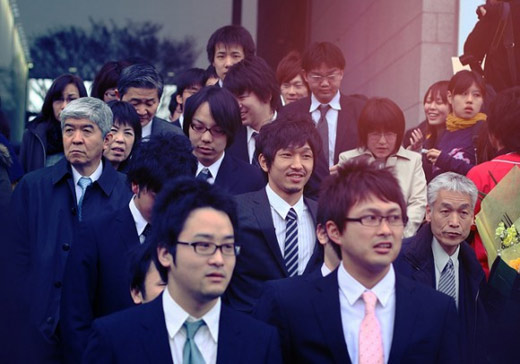當前位置: Language Tips> 雙語新聞
Study suggests Japanese workers are deeply distrustful of their employers
分享到

A study found that workers in Japan distrust their employers significantly more than workers in the US, UK, Canada and Australia do.
一項調(diào)查顯示,日本的員工比美國、英國、加拿大、澳大利亞等國的員工更不信任自己的雇主。
In the past, Japanese work culture revolved around one core belief: “l(fā)ifetime employment”. Workers would join a company after graduation from university and remain with that company until their retirement. Often, a strong bond would form between the worker and his (rarely her) company, with customs such as company-wide trips, and “bring your family” events. Accordingly, workers in Japan used to have an awful lot of job security, and job-hopping simply wasn’t a thing.
過去,日本的企業(yè)文化都圍繞“終生雇傭制”這一核心理念,也就是說,大學(xué)畢業(yè)后加入某個企業(yè)的員工可以為其效力直至退休。通常情況下,員工(多為男性)與雇傭企業(yè)之間會建立起強有力的感情紐帶,企業(yè)會組織員工集體出游和一些可攜家?guī)Э诘幕顒印S纱丝梢姡^去的日本員工有很多的工作保障,跳槽這種事發(fā)生的可能性幾乎為零。
Now, however, the only people who are generally granted job security for life are civil servants, who work at city hall for their entire career and get shuffled around every couple of years in a process called jinji-idou (personnel transfers) which is designed to keep things fresh. Those who work for regular companies, however, have much less obligation to stick with their employer than they used to, and, in turn, that has led to companies showing significantly less care for their employees. One has only to consider the high incidence of contract workers and part-time workers, and the emergence of so-called “black companies” which flout labour laws and in some cases treat their employees so badly, it can even drive them to suicide.
但就現(xiàn)在來看,也只有公務(wù)員才能享受到有工作保障的生活。他們的整個職業(yè)生涯都在為市政府工作,大約每幾年調(diào)動一次。這種所謂的“人事變動”的目的是保持新鮮感。而那些為一般企業(yè)工作的員工就不再像以前那樣甘為雇主奮斗終生,這也反過來導(dǎo)致公司對員工的關(guān)懷度大不如從前。你只需看看這么多的合同工和兼職工,再看看那些公然違反勞動法、把員工壓榨得想自殺的“黑心公司”就知道了。
A new survey conducted by Edelman PR polled Japanese workers to discover just how loyal they feel towards their employers in this economic climate. The results are unsurprising — only 40 percent of those polled agreed with the statement: “I trust the company I work for”.
愛德曼公關(guān)公司對日本員工進行了一次新民意調(diào)查,意在了解當前經(jīng)濟形勢下員工對雇主的忠誠度。調(diào)查結(jié)果在意料之中——只有40%的員工選擇“我信任目前所屬的公司”。
The results come as part of a larger poll in which the same question was posed to workers in 28 other countries; of that number, Japan ranked bottom in employer company trust. Mexico ranked highest with 89 percent agreeing to the statement. Other results included: United States (64 percent), United Kingdom (57 percent), Australia (54 percent), Canada (64 percent), Germany (62 percent), and France (48 percent).
愛德曼公司也就同樣的問題調(diào)查了其他28個國家的員工。經(jīng)比較發(fā)現(xiàn),日本員工對公司的信任度最低,而墨西哥人有89%選擇了“信任公司”,排在最前。其他結(jié)果還有:美國(64%),英國(57%),澳大利亞(54%),加拿大(64%),德國(62%),法國(48%)。
Another statement, “I foresee improvement in the next five years for myself and my ability to provide for my family” , was met with only a 19 percent agreement rate amongst white-collar workers, dropping to 15 percent amongst blue-collar workers. The global average was 55 and 47 percent respectively for white- and blue-collar workers, indicating that Japanese workers are generally highly pessimistic about their futures in their current companies.
關(guān)于調(diào)查中“我可以預(yù)見到,未來五年我的生活會改善,并能更好地養(yǎng)家”這一項,日本的白領(lǐng)員工只有19%表示認同,而藍領(lǐng)員工則只有15%。從全球平均值來看,白領(lǐng)和藍領(lǐng)員工的認同率分別為55%和47%。由此可以看出,日本員工大多對自己目前供職的公司的前景十分悲觀。
英文來源:rocketnews24
譯者:劉佳麗
審校&編輯:丹妮
上一篇 : 蘋果機設(shè)成這個時間會變磚
下一篇 : 反重力跑鞋讓你體驗月球漫步
分享到
關(guān)注和訂閱


翻譯
關(guān)于我們 | 聯(lián)系方式 | 招聘信息
電話:8610-84883645
傳真:8610-84883500
Email: languagetips@chinadaily.com.cn